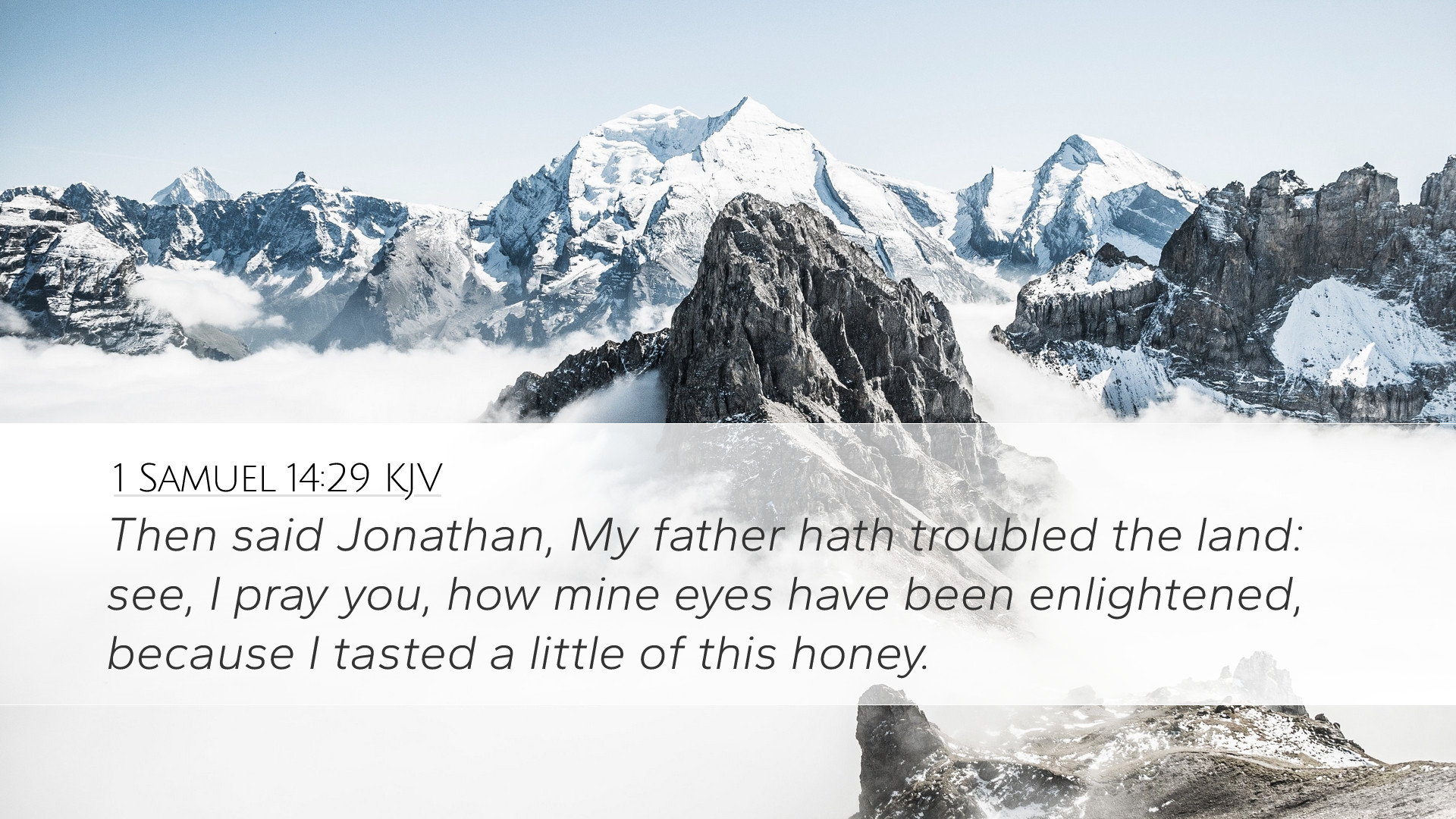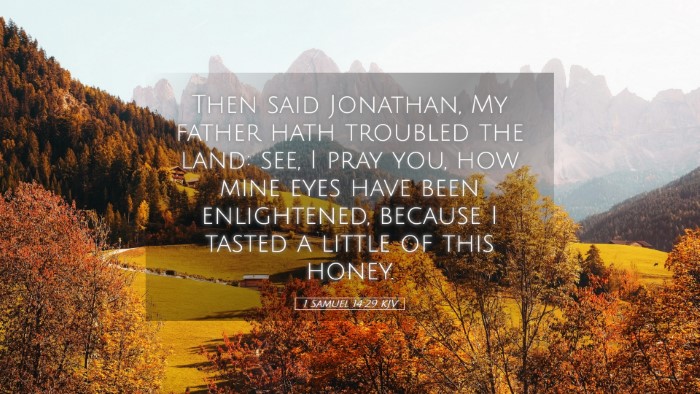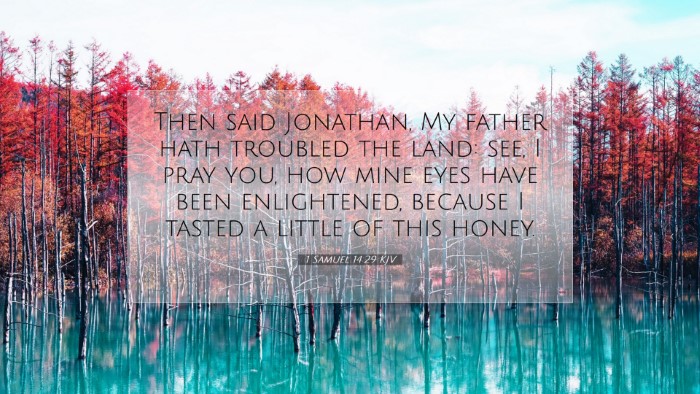Commentary on 1 Samuel 14:29
Verse Reference: 1 Samuel 14:29 - "Then said Jonathan, My father hath troubled the land: see, I pray you, how mine eyes have been enlightened, because I tasted a little of this honey."
Introduction
This verse comes in the context of a significant military engagement faced by the Israelites against the Philistines. Jonathan, the son of King Saul, had just participated in a remarkable victory that was influenced by a rash oath made by his father, Saul. Jonathan's acknowledgment here reflects not only his personal experience of the sweetness and refreshing nature of honey but also serves as a poignant metaphor for the oppressive leadership of Saul and the misjudgments made during this critical period of Israel's history.
Contextual Analysis
The historical setting of this verse is essential for understanding its implications. Saul's command forbade the troops from eating until evening, ostensibly to ensure focus and commitment in battle. However, this oath led to fatigue among the soldiers, highlighting how leadership decisions impact the morale and well-being of the people.
Insights from Public Domain Commentaries
-
Matthew Henry:
Henry emphasizes the contrast between Jonathan’s joyful experience of tasting the honey and the mourning of the soldiers under Saul’s command. He suggests that Jonathan’s enjoyment reveals the consequences of bottom-up leadership that neglects the needs and well-being of the soldiers. Jonathan, who acts independently from his father’s decree, symbolizes a wisdom and understanding that is grounded in personal experience. His exclamation, "My father hath troubled the land," indicates a recognition that oppressive leadership produces detrimental effects on the people.
-
Albert Barnes:
Barnes focuses on the illumination that Jonathan experienced after tasting honey. He notes that this experience symbolizes both physical refreshment and spiritual enlightenment. The sweetness of the honey opens Jonathan’s eyes to the adverse effects of his father’s judgment, revealing the wisdom in participating in God’s provision, which contrasts to the burdens created by Saul’s rash oath. This moment serves as a spiritual reminder for leaders at all levels to consider the well-being of those they lead.
-
Adam Clarke:
Clarke analyzes the implications of Jonathan’s remarks regarding his father's actions. He highlights that Jonathan’s use of "troubled the land" signals the weight of Saul’s covenant on the people. This phrase encapsulates the broader impact of leadership decisions at a communal level. Clarke argues that Jonathan’s act of tasting honey symbolizes a reawakening, a call to recognize God's goodness even amidst leadership failures. He stresses that true leadership involves nourishing those who follow with grace and wisdom rather than cursing them with harsh commands.
Theological Implications
This verse serves as a theological reflection on the nature of leadership and the responsibilities it entails. The consequent unfavorable effects of Saul's decree highlight a central tenet in biblical leadership: wise leaders consider the needs of their people. This idea is prevalent throughout scripture, where leaders are often judged based on their ability to lead with both strength and compassion. Jonathan stands as a figure of discernment, choosing to act in accordance with a divinely-informed understanding rather than blind allegiance to his father.
Leadership and Nourishment
The metaphor of honey is not merely about physical sustenance; it also provides a framework for understanding spiritual nourishment. The Israelites, like Jonathan, are called to experience the sweetness of God’s provisions, which contrast sharply with the bitterness that arises from rash and unyielding commands made by leaders. Pastors and theologians might reflect on their own practices in ministry: are they offering the sweetness of God’s grace, or are they burdening people with legalistic demands?
Application for Contemporary Ministry
-
Recognizing the Needs of the Congregation:
As ministers and leaders, it is vital to develop an awareness of the spiritual and emotional needs of those we serve. Just as Saul’s decision adversely impacted his men, a lack of awareness to the struggles of congregants can alienate them from the church’s mission.
-
Encouraging Personal Experiences of Faith:
Encouraging congregants to engage personally with Scripture and God’s provisions fosters an environment where they too can express their illuminations and blessings, similar to Jonathan's experience with the honey. This interaction forms a vital part of community and spiritual growth.
-
Addressing Leadership Accountability:
Leaders must be willing to receive feedback and challenge from their communities, as Jonathan challenged his father’s decisions. This openness can lead to healthier church dynamics and promote spiritual vitality among the members.
Conclusion
1 Samuel 14:29 provides rich material for theological reflection on leadership and the impact of decisions made by those in authority. The insights drawn from the public domain commentaries highlight the need for wise, compassionate leadership as demonstrated by Jonathan’s actions. For modern ministers, this verse serves as a reminder that true leadership should nourish the community and encourage them to taste and see the goodness of God’s presence, thus avoiding the troubles that stem from unwise decrees. Through Jonathan's experience, leaders are invited to promote a faithful response that reflects God’s care, ultimately enriching the life of the Church.


